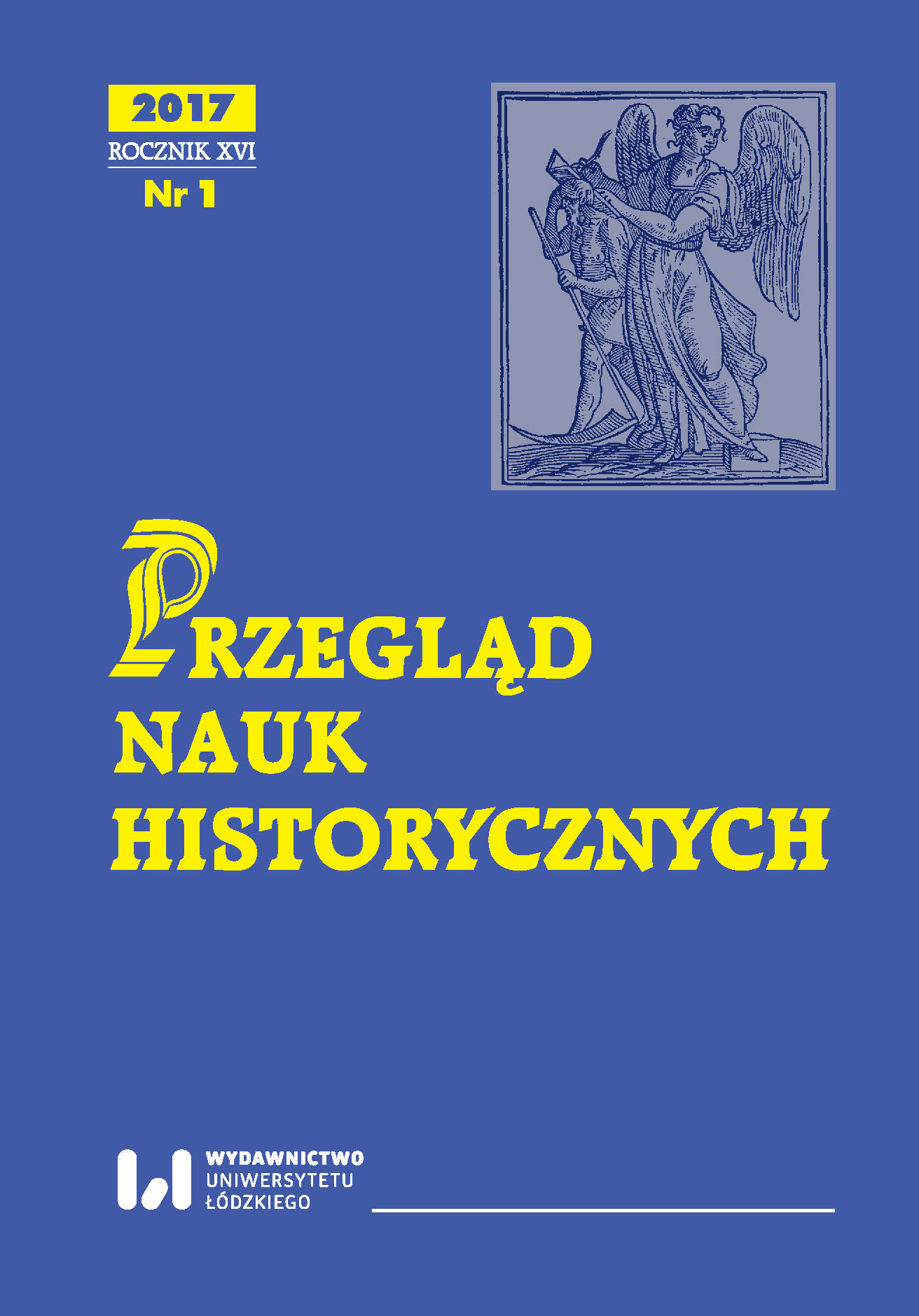The painting is a testimony of the inconceivable Abstract Expressionism and the Shoah (Mark Rothko, Barnett Newman, Frank Stella)
DOI:
https://doi.org/10.18778/1644-857X.16.01.07Keywords:
paintings, American Expressionism, abstraction, philosophy, testimony, ShoahAbstract
The history of Europe of 1933–1945 was very important and had a significant influence on painting of American artists of American abstractionism. This term – American abstractionism or New York abstractionism, although inexact and somewhat confused, currently is a constant term in the terminology of history of art. Taking this kind of art into consideration from the time between 1933 and 1945, recalling the special titles of art works and the context when they were created: Mark Rhotko’s numbered, gray, brown and black murals which he painted for Manhattans Seagram Building in the fifties or his black and brown pictures for Huston Chapel in Texas form the seventies as well as Barnet Newmen’s fourteen canvas titles The Stations of the Cross: Lema Sabachthani and Frank Stella’s minimalist canvas titles Arbeit macht frei (1958), The Polish Village Series and the cycle of twenty four paintings which he created in his adolescence time, considering their comments and biography we have to understand this art as the historical art. These three artists of American expressionism – Mark Rothko, Barnett Newman and Frank Stella, whom this article is devoted to – refer in some pictures to the catastrophe of Shoah. They give evidence of this cruel time by the image, ostensibly without formal coincidence, they attempt to express unimaginable. They want, to some extent, to force us to imagine what the hell of Shoah was like.
Downloads
References
Alloway L., Stations of the Cross and the Subjects of the Artist, [w:] Barnett Newman. The Stations of the Cross. Lema Sabachthani, katalog wystawy The Solomon R. Guggenheim Museum, New York 1966.
Google Scholar
Amishai M.Z., Depiction and Interpretation: The Influence of the Holocaust on the Visual Arts, Oxford 1993.
Google Scholar
Ashton D., About Rothko, New York 1996.
Google Scholar
Bartelik M., Na zewnątrz widzenia. Lekcje Marca Rothki, [w:] Mark Rothko. Obrazy z National Gallery of Art w Waszyngtonie, red. M. Bartelik, katalog wystawy Muzeum Narodowe w Warszawie, Warszawa 2013.
Google Scholar
Beckett S., Trzy dialogi z Georges’em Duthuit, [w:] Samuel Beckett. Esej. Wierność przegranej, przekł. A. Libera, M. Nowoszewski, Kraków 1999, s. 51–62.
Google Scholar
Breslin E.B.J., Mark Rothko. A Biography, Chicago 1989.
Google Scholar
Chave C.A., Mark Rothko. Subjects in Abstraction, New Haven 1989.
Google Scholar
Clearwater B., The Rothko Book, London 2006.
Google Scholar
Godfrey M., Abstraction and the Holocaust, New Haven 2007.
Google Scholar
Harrison Ch., Ekspresjonizm abstrakcyjny, przekł. H. Andrzejewska, [w:] Kierunki i tendencje sztuki nowoczesnej, Warszawa 1980.
Google Scholar
Hess B.T., Barnett Newman, New York 1971.
Google Scholar
Jedlińska E., Sztuka po Holocauście, Łódź 2001.
Google Scholar
Kleeblatt L.N., Tragedia u Macy’ego. Rothko i mit, przekł. M. Lavergne, [w:] Mark Rothko. Obrazy z National Gallery of Art w Waszyngtonie, red. M. Bartelik, katalog wystawy Muzeum Narodowe w Warszawie, Warszawa 2013.
Google Scholar
LeVitte H.D., Przekładanie bólu na kolor, przekł. D. Kozińska, [w:] Gdzie jest brat Twój, Abel?, katalog wystawy Galerii Zachęta w Warszawie, Warszawa 1995.
Google Scholar
Mark Rothko. Writings on Art, ed. M. Lopéz-Remiro, New Haven–London 2006.
Google Scholar
Newman B., The Stations of the Cross. Lema Sabachthani, New York 1966.
Google Scholar
Newman B., O’Neill J.P., McNickle M., Shiff R., Selected Writings and Interviews, Berkeley–Los Angeles 1992.
Google Scholar
Pappas A.P., Mark Rothko and the Politics of Jewish Identity, 1939–1945, Los Angeles 1997.
Google Scholar
Przybyła A., Mark Rothko i Four Seasons: murale do Seagram Building na Manhattanie, [praca magisterska napisana w Katedrze Historii Sztuki Uniwersytetu Łódzkiego pod kierunkiem E. Jedlińskiej], Łódź 2014.
Google Scholar
Richardson B., Frank Stella: The Black Paintings, Baltimore 1976.
Google Scholar
Rose B., Malarstwo amerykańskie dwudziestego wieku, przekł. H. Andrzejewska, Warszawa 1991.
Google Scholar
Rosenblum R., Modern Painting and the Northern Romantic Tradition. Friedrich to Rothko, New York 1975.
Google Scholar
Rothko Ch., Mark Rothko i muzyka, przekł. M. Lavergne, [w:] Mark Rothko. Obrazy z National Gallery of Art w Waszyngtonie, red. M. Bartelik, katalog wystawy Muzeum Narodowe w Warszawie, Warszawa 2013.
Google Scholar
Rothko M., The Artist’s Reality. Philosophies of Art, ed. C. Rothko, New Haven–London 2004.
Google Scholar
Stoller E., Schulze F., The Seagram Building, Princeton 1999.
Google Scholar
Tomkins C., The Space Around Real Things, „The New Yorker”, 10 IX 1984.
Google Scholar
Chave C.A., Minimalism and the Rhetoric of Power, https://www.msu.edu/course/ha/452/chaverhetoric.pdf (dostęp: 18 III 2016 r.).
Google Scholar
Friedman B.H. (B.H.), The Most Expensive Restaurant Ever Built, „Evergreen Review” 1959, No. 10, http://www.evergreenreview.com/120/friedman.html (dostęp: 12 III 2016 r.).
Google Scholar
Hellstein V., Barnett Newman, The Stations of the Cross: Lema Sabachtani, „Object Narrative. In Conversations: An Online Journal of the Center for the Study of Material and Visual Cultures of Religion”, http://mavcor.yale.edu/conversations/object-narratives/barnett-newman-st (dostęp: 13 IV 2016 r.).
Google Scholar
Hess B.T., A Conversation. Barnett Newman and Thomas B. Hess, New York 1971; maszynopis tekstu Hessa – https://www.moma.org/momaorg/shared/pdfs/docs/press_archives/4731/releases/MOMA_1971 (dostęp: 13 III 2016 r.).
Google Scholar
Newman B., The New Sense of Fate, http://www.warholstars.org/abstractexpressionism/timeline/abstractexpressionism51.html (dostęp: 17 IV 2016 r.).
Google Scholar
Newman B., Surrealism and the War, http://www.warholstars.org/abstractexpressionism/timeline/abstractexpressionism1945b.html (dostęp: 13 III 2016 r.).
Google Scholar
https://pl.wikipedia.org/wiki/Horst_W (dostęp: 20 III 2016 r.).
Google Scholar
Downloads
Published
How to Cite
Issue
Section
License
Copyright (c) 2017 © Copyright by Authors, Łódź 2017; © Copyright for this edition by Uniwersytet Łódzki, Łódź 2017

This work is licensed under a Creative Commons Attribution-NonCommercial-NoDerivatives 4.0 International License.













